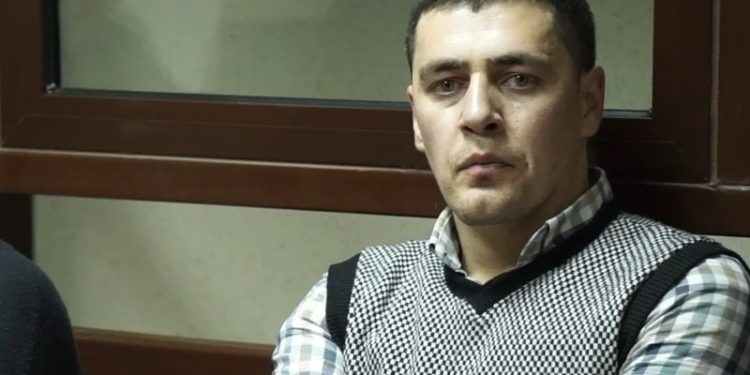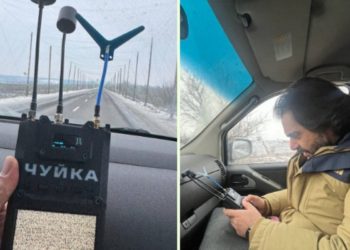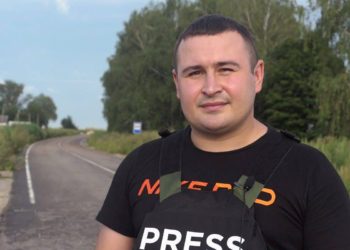The condition of citizen journalist Amet Suleymanov, who was sentenced to 12 years in prison, significantly worsened after the sentence and the transfer to the Volodymyr center — he urgently needs an operation to replace a heart valve. This was told to Crimean Solidarity by the journalist’s wife, Lilya Lyumanova, who was able to talk to her husband on a short-term date.
According to Lilya Lyumanova, even before the verdict, when Suleymanov was under house arrest, he tried to get in line for an operation at the state hospital. However, it was never possible to replace the valve, although he was not in such a serious condition then as he is now, after the transfer to prison.
Lilya Lyumanova said that in prison, she was able to talk to the head of the medical service about whether her husband would undergo an operation. As Lyumanova noted, she did not receive an unequivocal answer. According to the medical head and the head of the labor department, doctors sent a request for an operation to the cardiac surgery center in Moscow, but there is no official confirmation of this, except for the words of employees of the Federal Penitentiary Service of russia. The prison in Moscow also did not say anything about the terms of consideration of this request.
“If the operation is not performed now, the load will go to the second heart valve, and it will be necessary to change not one, but two,” Lilya Lyumanova stressed.
As reported, in May 2024, Amet Suleymanov had a hypertensive crisis. Due to high blood pressure, the political prisoner has constant nosebleeds, often feels dizzy, and has shortness of breath. Chronic problems with the heart also affected the blood vessels – the illegally convicted Crimean Tatar for a month demanded that he be given the medicine sent by his wife. He received the drops only a few days ago when the blood vessels in his eyes burst.
As the political prisoner’s wife said, he now receives drugs for heart pain and pressure but does not receive drugs to support the liver, as well as blood thinners. Due to a sedentary lifestyle, there are risks of blood clots.
Previously, Amet was still given blood-thinning drugs, but they were canceled after a short time. The doctors do not report why Amet‘s drugs are no longer given. “You won’t learn much from them. This is a prison; people of few words work there and will not explain their decisions. Medicines are partly given, partly not. <…> But, according to Amet, I did not hear him say that doctors treat him badly. They dispense the medicine according to the required dose – he himself does not have access to the drugs. I even remember, at a long meeting in April, the paramedic came on the third day and brought the pills personally because Amet left without medicine. Maybe they are afraid that something might happen to him,” Lilya Lyumanova said.
She also reported that her husband often has nosebleeds and other health problems due to high blood pressure. “He says he doesn’t notice it. He wakes up – the pillow is covered in blood, and it’s hard to breathe because the blood in his nose dries up. <…> He lost much weight. In April, on a long date, I noticed that he had lost weight. And now even more. He eats only food in the dining room. I have the right to send him only one package of 20 kilograms per year, so there are no excesses. He occasionally buys tea, lemons, apples, and sweets at the store,” said Amet‘s wife.
As earlier reported, Amet Suleymanov is a Crimean Tatar, convicted together with the members of the third Bakhchisarai group in the case of membership in the Hizb ut-Tahrir political party. He is a citizen journalist.
On October 22, 2019, police officers detained him on the Kerch Bridge when he was returning to Crimea from a trial at the Southern District Military Court in a politically motivated case against a resident of Crimea. A few hours later, the man was released.
In addition to heart disease, Amet Suleymanov has a disability, but in 2015, it was removed due to his refusal to undergo an operation in Moscow — Suleymanov received systematic treatment in a Kyiv hospital and planned to perform the operation under the supervision of his regular doctor.
After the search and subsequent detention, on March 11, 2020, the court in Simferopol decided to place Suleymanov under house arrest — one of the few cases in the practice of Hizb ut-Tahrir criminal cases in russia.
Amet Suleymanov was under house arrest throughout the trial. Initially, he was taken to the Southern District Military Court in Rostov-on-Don for a hearing, but later, he was allowed to speak via video link from the Crimean Garrison Military Court. Even in such conditions, the defendant could hardly stand court sessions. Sometimes, they had to be interrupted so that he could see a doctor. The defense tried to convey to the court that a similar measure cannot be applied to Amet Suleymanov due to his health.
The Southern District Military Court, despite the defense’s numerous statements about Suleymanov‘s health, decided to send him to a high-security prison for 12 years. His defender, Lilya Hemeji, considers it a death sentence: “He was sentenced to die. Imprisonment for a person with such a diagnosis is cynicism.”
In March 2024, the Frunze District Court in Volodymyr also, as in the appeal, refused to release Amet Suleymanov from prison despite the fact that his diseases are included in the list of conditions incompatible with imprisonment.
In July of this year, the Volodymyr Regional Court refused to release a Crimean Tatar from prison despite the fact that he has two diseases incompatible with detention in correctional institutions. According to Suleymanov‘s lawyer, Lilya Hemeji, the data of the research part in the medical opinion, which was drawn up by the Federal Penitentiary Service, contradicts the general conclusions.
Thus, in the experimental part, highly specialized doctors indicated the codes of the international classification of diseases, which coincided with the diseases of Amet Suleymanov. But the general conclusion says that he can continue to serve his sentence. The court ignored this argument and denied the defense in questioning the doctors who drew up the opinion, as well as in an independent medical examination.
NUJU Information Service

 THE NATIONAL UNION OF
JOURNALISTS OF UKRAINE
THE NATIONAL UNION OF
JOURNALISTS OF UKRAINE
















Discussion about this post